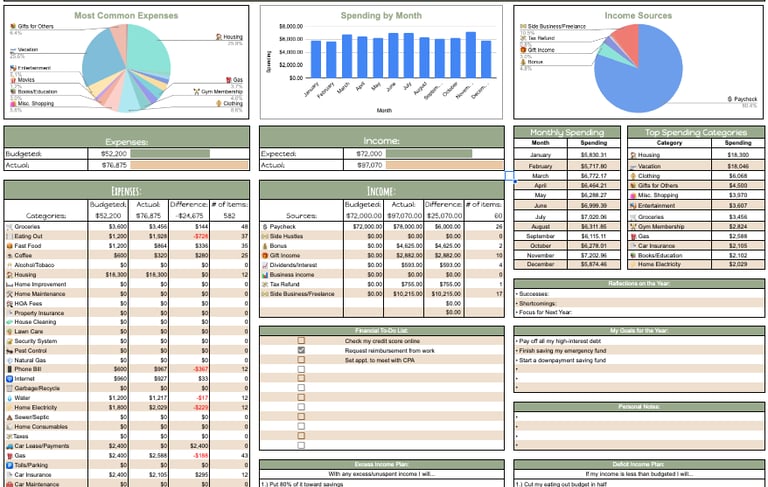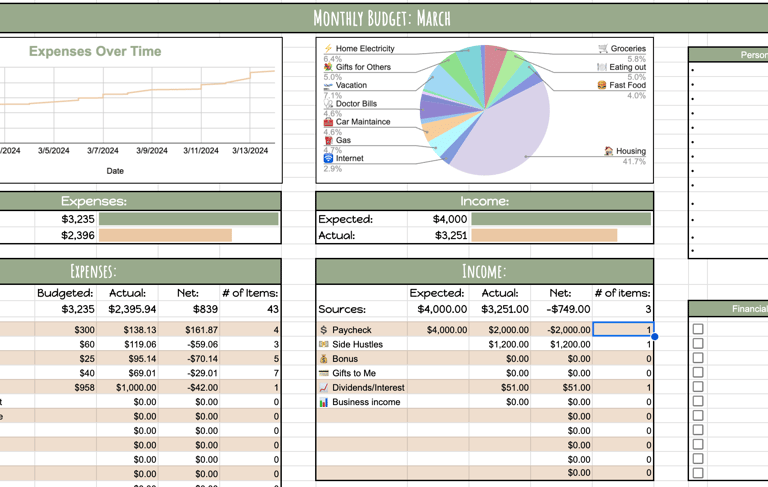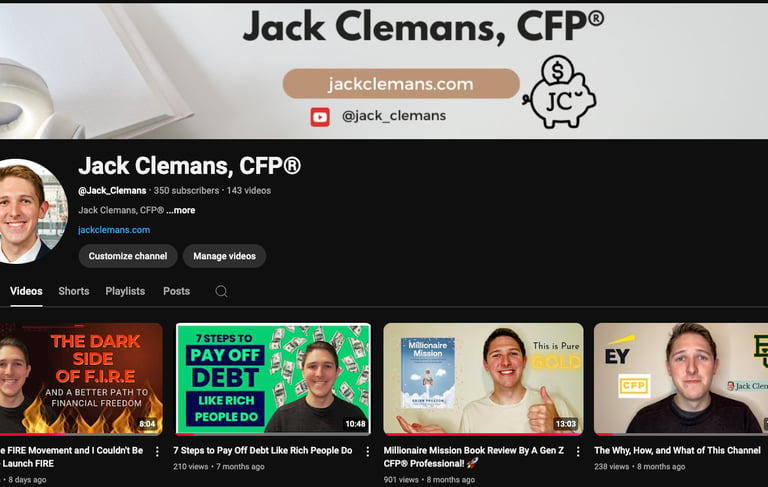Free Resources
What Makes a Good Budget?

Holistic
My budgeting template provides quickly viewable and intuitive information designed to assist you with setting goals without overwhelming you with fluff. The pie chart helps to identify the largest expense categories and the line graph helps to identify days when expenses tend to spike in addition to all transactions being tracked by category, number of transactions, income and expense totals, and instant feedback if you're meeting or exceeding budgeting goals.
Customizable
I was so tired of the limited categories and lack of customizability offered by other budget options. Why are my expenses for gas, oil changes, car washes and vehicle maintenance all lumped into one category called "Vehicle Expenses?" When the categories are too broad, the insights provided by the template become useless. With my template you can input over 150 different expense categorizes to completely customize the template to your needs.



Hands-On
Not only is this budgeting approach cheaper than outsourcing it to apps for automatic tracking, it is also clearer, more accurate, and more impactful. You will no longer need to worry about miscategorization ruining your budget, as you will personally be the one to categorize it all. You will also cut through the noise of pending and redundant transactions, reimbursements, payments to cards, and other issues commonly found on auto-synching budgeting applications.
Powerful and Aesthetic
Many budgeting templates built on spreadsheet programs are about as fun to look at as... well... a spreadsheet. I believe in making it as easy and frictionless as possible to engage with your budgeting spreadsheet which, for me, means it should look good as well as being functional. Adding color or emoticons may seem like a small change, but it is that kind of attention to detail that can help get you the rest of the way to sticking to the lifechanging habit.
$10 Google Sheets Annual Budgeting Template
Take control of your money and your future with my Annual Budget Template. It's a simple but powerful tool designed to give you year-round clarity, confidence, and peace of mind. Built by a CERTIFIED FINANCIAL PLANNER™, this tracker helps you see exactly where your money goes, stay on top of bills and goals, and finally make progress toward the life you want. All for just $10.
Includes a 14-day money-back guarantee


FREE Google Sheets Monthly Budgeting Template
Finally get hands-on with your finances and take back control using my monthly budgeting template! As a CFP® professional, I found that existing budgeting software was too passive and inconsequential. That's why I developed this template, honing it over time through my own household finances and insights gleaned from extensive client interactions.


Free Video Resources
On my YouTube channel, I break down personal finance with a no-nonsense, practical approach. As a CERTIFIED FINANCIAL PLANNER™, I help viewers make smarter money decisions through clear, unbiased advice, whether it's budgeting, investing, or financial independence. No fluff, just real financial strategies that work.


Free Mortgage Calculator
Before you buy a home you should know what your monthly payment would be. Mortgage lenders will often offer you a much higher limit than what you can afford to cash flow, and many times we forget the costs associated with property taxes and insurance.
If you don't yet know your interest rate, you can find weekly national estimates here: https://www.bankrate.com/mortgages/mortgage-rates/?mortgageType=Purchase
You can use this link from the Tax Foundation to estimate the taxes you will pay for your state and county: https://taxfoundation.org/data/all/state/property-taxes-by-state-county/
Insurance is much more variable based on location, home type, home age, home condition, etc so the best policy is to research rates in your area. However, a rough rule of thumb for the calculator may be to estimate about 1% of the value of the home in annual insurance costs. If you are putting less than 20% down you will also have to pay Private Mortgage Insurance (PMI) so add about $50/month ($600/yr) for that as well. Lastly, add 1%-4% for ongoing maintenance, depending on the age/condition of your home and if it has warranties.
Tools for Success
Articles
Contact Me
Jack@ClemansFinancial.com
Jack Clemans, CFP®, ABFP®
Clemans Financial LLC provides financial education and coaching services. We do not offer investment advisory services, manage assets, or provide specific investment recommendations. The information on this site is for educational purposes only and should not be considered financial, tax, legal, or investment advice. Please consult a qualified professional regarding your specific situation. Any financial decisions you make are your own, and Clemans Financial LLC is not responsible for any outcomes resulting from the use of this information.
